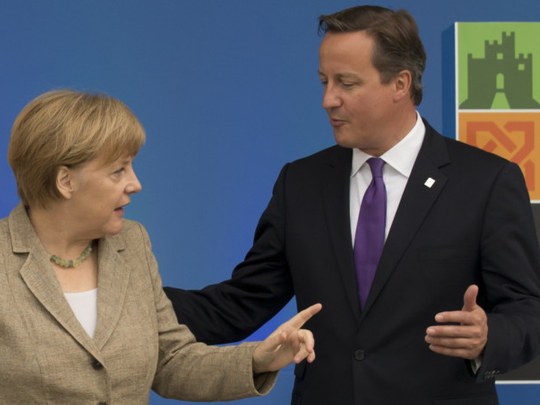
Formally or informally, whoever you spoke to, at whatever level of the political and economic hierarchy, the message from Germany was always clear: Berlin wants the UK to remain in the European Union and will do its utmost to prevent its departure. That appeared to change recently when the influential German news magazine Der Spiegel reported that German Chancellor Angela Merkel feared the UK was near “a point of no return” in its relations with Europe.
The specific point on which Germany could withdraw its support for the UK — no surprise here — is migration. Merkel has repeatedly said that Germany will not compromise on the principle of free movement, which it regards as one of the founding precepts of the EU. It seems not only that the chancellor will not budge on this score, but also that she is already preparing for the hitherto undesired consequence: A UK departure — “Brexit” in Euro jargon — if British Prime Minister David Cameron takes curbs on freedom of movement as his red line.
As so often with what look like major policy shifts, there is room for caveats. Der Spiegel quoted “government sources” , not Merkel directly, and the magazine is not averse to stirring the international pot from time to time. We are at the beginning of a new EU political term, with a new European commission in place. Everyone wants to put down their marker.
On the other hand, the possibility of a deliberate warning shot fired from the German chancellery across the British prime minister’s bows cannot be excluded. What are seen from across the Channel as newly dangerous shenanigans in the UK on the old theme of Britain and Europe are testing the patience of many EU governments, but of Germany’s in particular.
This may be partly because of a fairly tame — by UK standards — upsurge in anti-migrant feeling there that has encouraged Merkel to lay down her own red line on free movement before that sentiment grows further. Or it may be because Merkel and others have just had it up to here with Cameron’s claims for UK exceptionalism and want to try a new ploy.
All right, they are now saying, rather like a child in a quarrel: Do what you like; break up with us if you want — we’re not going to chase after you to get you back. This was pretty much the interpretation preferred in London today, along with an insistence — from Chancellor of the Exchequer George Osborne and others — that the government would act only in the national interest in responding to public concern over migration.
Ukip’s promises
There are two difficulties with this approach. The first is that Britain’s electoral timetable leaves Cameron with very little political room for manoeuvre. It may be that the Conservatives have mentally ceded the byelection in Rochester on November 20 to UK Independence Party (Ukip). They may also be consoled by the idea that people vote differently in general elections from how they vote in byelections.
But the way that Ukip’s promises combine popular worries about migration with hostility to the EU — concerns that then feed on each other — makes for a closed argument that is hard for Cameron and his ministers to break (even if they wanted to, which is by no means certain). One halfway house — a proposal to limit the number of new national insurance numbers issued to unskilled EU migrants — has already, it appears, been ruled out by Brussels as a breach of free movement. Cameron will have to show more ingenuity — less focus, perhaps, on numbers and more on contributory benefits — if he wants to reduce migration within current rules. Realistically, though, he will not be able to show much flexibility before May.
The second difficulty with the government’s dismissive approach to what looks like a significant shift in Merkel’s position is its abysmal record in reading German intentions.
Time and again, Cameron has seemed to bank on what he sees as assurances of support from the German chancellor for his endeavours, only to be disappointed when it turns out that in a clash between London and Brussels, Germany’s loyalties will be to the EU.
If Cameron has a failing as a politician it is in his ability to “read” foreigners. He does not travel well, and that even includes to the United States. In this respect, he has been fortunate in his coalition partner. Nick Clegg is the consummate cosmopolitan, and he has been able to pick up much of the slack. But Clegg cannot replace the prime minister in Europe, nor can he help Cameron in the run-up to an election in which a rightwing Eurosceptic party is snapping at the Tories’ heels and the outcome is one of the least predictable on record.
All in all, the prospects for UK-EU relations over the next six months are dispiriting. Cameron will doubtless feel unable to make anything that might be seen as a concession to Brussels before May 2015, still less tone down his language. And there is a real risk that, even if Merkel is trying to nudge Cameron in a friendlier direction by raising the spectre of an EU without Britain, the effect will be to make such an eventuality look possible.
Brexit then becomes an accepted fact, even before any in-out referendum is held. All those who care about Britain remaining in Europe need to make their arguments now.
— Guardian News & Media Ltd
Mary Dejevsky is a writer and broadcaster. She is a former foreign correspondent.









